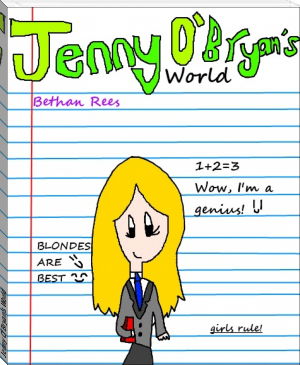The History and Records of the Elephant Club by Doesticks and Underhill (leveled readers txt) 📖

- Author: Doesticks and Underhill
Book online «The History and Records of the Elephant Club by Doesticks and Underhill (leveled readers txt) 📖». Author Doesticks and Underhill
As they had come in a carriage and were prepared for immediate conquest, they had no overcoats or hats to dispose of, and were consequently ushered directly into the first of the three parlors, they held a consultation as to which was the hostess; and what the least perilous manner of getting at her, concluded that it was not necessary for a Turk or a Heathen to be so particular about the rules of Christian society, and so they dispensed with the usual entering salute.
Remington Dropper soon found that he was not the only oriental in the room; there were four other Turks, and a great many Moguls, so that he only made up the half dozen, but he consoled himself with the reflection that his turban was the biggest, and that the toes of his slippers turned up higher than any of the rest.

But beside the "malignant and the turbaned Turks," there was a great variety of other unexpected characters on exhibition in Mrs. Daylight's apartments—kings, queens, gipsies, and highway[Pg 313]men, milkmaids, who not only couldn't milk, but probably couldn't tell a cow from a cod-fish, peasant-girls with jewelry enough on for princesses, and princesses with red faces and feet big enough for peasants, tambourine girls begging for pennies which they couldn't get, and bouquet girls trying to sell flowers from a large assortment, consisting of two geranium leaves and a rose-bud, French grisettes, who couldn't speak French, and Spanish noblemen, who talked most unmistakable down-east Yankee, Highlanders with pasteboard shields and bare knees, army officers who didn't know how to shoulder arms, sailors who couldn't tell the keel from the jib-boom,[Pg 314] or swear positively that the tiller wasn't the long-boat, the Queen of Sheba in gold spectacles, robbers, brigands, freebooters, corsairs, bandits, pirates, buccaneers, highwaymen, fillibusters, and smugglers in such quantities, that it might be supposed that our best society is two-thirds made up of these amiable persons. There were three Paul Prys, four Irishmen, and thirteen Yankees, equipped with jackknives and shingles, seven Hamlets, and fourteen Ophelias, one Lear, two Richards, and five Shylocks, eight Macbeths, three Fitz James, and half a dozen Rob Roys, who made a very respectable assortment of Scotchmen; there were also twenty-one monks, quite a regiment; this was considered strange, but the next day, when most of the silver was missing, it was immediately surmised that these reverend gentlemen were thieves, who had obtained surreptitious admission, and carried off the valuables under their priestly robes.
There were also a few ladies, particular friends of the hostess, who appeared, by permission, in no costume more ridiculous than that which they were accustomed to wear daily, but who displayed the usual amount of whalebone developments.
After the band arrived and was stationed in the conservatory out of sight, an attempt was made to get[Pg 315] up a dance. Spout introduced Dropper to a princess of his acquaintance, and Dropper, as in duty bound, asked her to waltz, and actually proceeded to carry out his intention.

As some sixty other couples attempted the same feat at the same time, and as there wasn't room for any one man to dance without stepping on the heels of his neighbor, the scene instantly assumed a peculiar appearance. Dropper first whisked his partner against a flower girl and upset her basket, then against a Paul Pry, and demolished his horn spectacles, then he tumbled her into the stomach of a Falstaff and rolled him into the window curtains, then[Pg 316] he himself stepped on the favorite corn of a tall Hamlet, and pushed his elbows into a Shylock and broke his false hooked nose, and they both concluded their gyrations by upsetting a couple of brigands, and marching deliberately over the prostrate bodies of Helen McGregor and a matchboy in their progress to a sofa, which they finally reached in an exhausted condition; the lady wanted some water, which Remington started to get but didn't come back, inasmuch as he hurt his shins by tumbling over a chair and fell to the floor, carrying with him in his descent a fairy in one hand and a Fitz James in the other. The crowd immediately closed around him, so that he could not rise, and, as he was involuntarily reposing directly upon the hot air register, he was more than half cooked before he got rescued out.
The attempt to dance created also no small amount of confusion among the others, about twenty-five of whom were precipitated into the conservatory and dispersed through the orchestra. King Lear landed with his head in a French horn, and Byron's Corsair was seen to demolish two violins with his hands at precisely the same time he kicked both feet through the bass drum.
Supper came at last, and the guests were fed in installments, as many getting near the tables as could[Pg 317] crowd into the rooms. Jellies, creams, fruits, and the more substantial articles of the repast, were devoured, and scattered over the carpets, and over the dresses of the assembled multitude, in about equal quantities. Champagne corks flew, and all the men of whatever nation, trade, or occupation represented in that incongruous assemblage, seemed to understand perfectly well what champagne was. Kings drank with peasants, brigands touched glasses with monks, and Shylock the Jew took a friendly drink with her majesty the Queen of Sheba.
After supper the smash recommenced, and things grew worse, and the characters, by continued exertion and repeated accidents, became so changed in appearance by the mutilation of their fancy dresses, that at three o'clock in the morning, no one could have picked out any one of the remaining guests and told whether he was intended for an Italian brigand or an Irish washerwoman.
Our friends reached home about daylight, tired, draggled, disgusted, and drunk. Neither of them undressed, but both slept on the floor in the remains of their fancy costume, and in all their paint; they didn't get their faces clean for ten days, but Remington Dropper had seen the Elephant in one of his Fifth Avenue aspects, and was content.
 [Pg 318]
[Pg 318]
[Exeunt Omnes.]—Shakespeare.
A few days after the events recorded in the last chapter, a letter was received at the residence of one of the compilers of these records, superscribed
Q.K. PHILANDER DOESTICKS, P.B.
The communication was signed by John Spout, and the writer, after apologizing for communicating with a perfect stranger, stated his reasons for so doing. It seems from the communication that Mr. Spout was informed by a friend who was in the confidence of the United States Marshal, that Mr. Spout and others were accustomed to meet in a room on Broadway, and that they were strongly suspected of being engaged in the organization of a fillibustering expedition to Nicaragua, and furthermore, that it was the intention of the officious officials of the United States Government to make a descent upon the[Pg 319] premises and arrest all who were present on the next regular meeting. Mr. Spout had no difficulty in convincing his friend of the entire misapprehension of the officers. But in the fullness of his modesty the worthy Higholdboy thought that the time was not arrived when it would be prudent to announce to the world the fact of the existence of a scientific association, organized for the purpose of studying the Elephant. Furthermore, he did not like to be arrested, even though he would be acquitted, fearing that contact with stone walls might aggravate a chronic catarrh with which he was afflicted. Under these circumstances, he called a mass meeting of the members of the club, at his private room, where, after a session of fourteen minutes it was unanimously
Resolved, That the Elephant Club cave in for the present, under the pressure of strong necessity.
Resolved, That the landlord of the Club room whistle for the arrearage of rent.
Resolved, That Q.K. Philander Doesticks, P.B., we have every reason to believe, will fully appreciate the high character of the objects of the Elephant Club.
Resolved, That he is hereby authorized to go to the Elephant Club room, secure the records and[Pg 320] such other property therein contained, as he may desire.
Resolved, That the said Q.K. Philander Doesticks, P.B., is further authorized to compile the said records for publication, if he thinks the public can be induced to buy the book when it is published; and he is further authorized to reorganize the Club in accordance with the same principles of the old organization, and when the present federal administration goes out of power, the present members will again put on the scientific harness, and gladly co-operate with the club so formed, to secure the ends desired.
In accordance with the request contained, Mr. Doesticks did go to the premises designated, where he found said records, and a variety of articles of furniture in a state of chronic demolition. The records he carried away—the furniture he did not. An examination of the documents satisfied Doesticks that if properly compiled, and published, the work would sell. But feeling himself incompetent to the task of preparation unaided—the work being of a scientific character—he decided to call to his assistance his friend Knight Russ Ockside. In his youth this gentleman had the advantage of being employed in sweeping out the medical college in Thirteenth street,[Pg 321] and was once severely injured when young by being hit with a medical book on the head; and these facts it was generally conceded, in accordance with the spirit of modern progression, entitled him to the honorary degree of M.D. The scientific part of the work of compilation was therefore left to Dr. Ockside, who has endeavored to do full justice to the subject. Doesticks has reorganized the Elephant Club, and applications for membership will be received by him at No. 70001, Narrow street.
N.B. Applicants will be particular to bring testimonials as to character.
 No persons will be received against whom a shadow of suspicion exists that they are of foreign birth, whilst to be a native would be a permanent bar to their membership.
No persons will be received against whom a shadow of suspicion exists that they are of foreign birth, whilst to be a native would be a permanent bar to their membership.
THE END.
THE MEMOIRS
OF
REV. SPENCER H. CONE, D.D.
PREPARED BY HIS FAMILY
484 pp. 12mo. Bound in Muslin, Printed on fine white paper, Price $1 25
Embellished with a Steel Portrait.
Dr. Cone, late pastor of the First Baptist Church, city of New York, was one of the most remarkable men of the present age, his life was full of romance and incident, as as well as a bright example of Christian virtues; the volume should find a welcome at every fireside, and a place in every family library.
Among the numerous testimonials from all sections of the country, we take pleasure in quoting the following:
NOTICES OF THE PRESS.
"A Biography of a famous preacher and man, written with power and eloquence."—Philadelphia Evening Post.
"Its perusal will be grateful to every person who admires active piety and can appreciate Christian virtues."—Family Journal, Albany.
"Spencer Houghton Cone, one of those good and faithful servants whose career exemplifies the surpassing beauty of a genuine religious life. The work is produced in elegant form, with a superb engraving of Dr. Cone. It deserves a place as a standard of good works and deeds in all families."—N.Y. Daily News.
"Its subject, one of the first men, and leading minds, for years, in our denomination, will ensure it a wide circulation."—Richmond, Va. Herald.
"Mr. Cone's reputation as an eloquent and fervent minister of the Gospel, as a strong, clear, earnest thinker, was acknowledged throughout the Union."—Boston Gazette.
"The book is full of interest, and we are confident will disappoint none who undertake its perusal."—Salem Gazette.
"America has produced but few so popular preachers, his personal influence was unbounded, he was indeed a man of talent, of large attainment in the school of Christ, a brilliant preacher, and a noble-hearted, zealous Christian philanthropist."—Christian Chronicle, Philadelphia.
"The volume is a profoundly interesting life-memorial of one of the most active, earnest, eloquent and sincerely religious spirits of his age and generation. Spencer H. Cone was a very remarkable man, and from a perusal of his life, we are convinced that selfishness and narrow-mindedness had no place in his nature. He appears to us to have been a model of earnestness, sincerity, activity, and intelligence." —New York Evening Mirror.
"The volume is a straightforward simple narrative of the public and private life of Dr. Cone, from his youth up to the period of his death. It will be read





Comments (0)